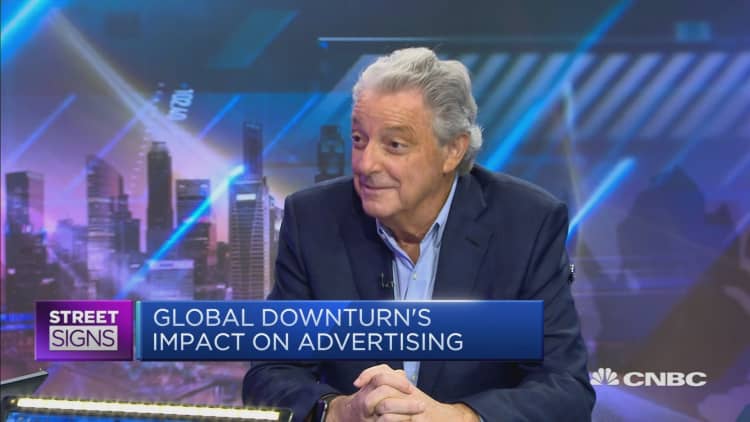Gap said this week it has made the mistake of advertising its discounts at the expense of building brand loyalty for Old Navy.
It seems to be a trend, as Gap joins several other companies lamenting that they've neglected brand marketing in favor of discounts or performance-driven ads. Adidas and Booking Holdings each said recently they've moved spending back to brand marketing after realizing they were spending too much in areas such as performance marketing. TripAdvisor, which has been a big spender on Google, has also made moves such as hiring a new creative agency to create more direct consumer loyalty to its brand.
With short tenure times for chief marketing officers, the time to impress a board or investors can be fleeting. That can lead to an overindulgence on short-term marketing objectives.
"There's a mindset of, 'Tell me what's happening this quarter, don't get me involved in three quarters from now,'" said Noah Mallin, head of experience, content and sponsorship at WPP media agency Wavemaker. "I have a lot of sympathy for that ... but there are a lot of brands that are realizing that there's a point at which all of the direct-response marketing and all of the price messaging just stops being effective, or effective as it was."
The whole thing can be a "little bit like cocaine," he says.
"For people that get hooked on it, you do it and do it, you end up needing more and more to get to the same place more and more," he said. "Once consumers become acclimated to the idea that you're willing to discount and that's a huge part of the messaging, they won't buy until they see that message again."
Brand loyalty drives long-term success
In Gap's third-quarter earnings call Thursday evening, the company's executive VP and chief financial officer Teri List-Stoll admitted its Old Navy brand has "frankly become too heavily dependent on messaging around discounting as opposed to bigger-picture brand messaging, focusing on product and value that we know resonates with the Old Navy consumer."
In the fourth quarter, Old Navy has "recalibrated" its messaging to focus on its designs for the holiday season "combined with compelling price points and commercial plans." It's also investing more in partnerships and campaigns such as a holiday TV campaign with Neil Patrick Harris.
Although digital ads about steep discounts can get some customers to buy at a certain moment in time, they might not do as much to communicate the quality of the product and what the brand stands for, or to create an emotional response in a consumer. In contrast, a great Super Bowl ad might not get a consumer to buy something from a brand that night but helps build an emotional connection that has longer-game consequences.
"As irrational human beings, things like digital media can have wonderful nuances to [drive] a transaction, but they don't necessarily create brand loyalty," said Mike Duda, managing partner at strategic creative agency and consumer investment firm Bullish.
But both can have a home in a healthy marketing budget. It should be thought of as a mix, not as one or the other, Duda said.
"When people go all in on digital performance [and say] 'No one should do the Super Bowl' — that's just ridiculous," he said.
Lindsay Nelson, president of TripAdvisor's Core Experience business unit, told CNBC that the company has consumer trust but wants to build an emotional connection with its new creative agency, Mother.
"I think one of the things that happened with the rise of the internet was the ability to target and track everything that's measurable," Nelson said. "When things are measurable, they're comfortable. ... While that can drive immediately measurable short-term action, it doesn't create that thing you can only measure by the hair on your arms standing up, which is that pervasive emotional connection and loyalty between brand and customer."
Nelson added that with so much consumer choice, sometimes people are making decisions based on price or discounts. But a lot of the time, they're making decisions based on their gut and other emotional factors they might not even realize.
"It's that emotional connection with the brand that creates long-term loyalty," she said.
Other brands have had "we've been slacking on brand marketing" realizations in recent months. Adidas global media director Simon Peel recently told attendees at an industry conference that its focus on return on investment, or ROI, caused it to over-invest in digital and performance marketing at the expense of brand building, Marketing Week reported in October. Peel said the company was overly focused on short-term metrics, the "wrong metrics," because it was trying to create value for shareholders.
In August, Booking Holdings, parent of Booking.com, Priceline and Kayak, said it was trying to diversify away from spending on Google as it seeks to increase investment in brand marketing such as TV commercials and online videos. The decreasing ROI on performance marketing, primarily Google, was a driver for that.
Results weren't appearing immediately, but CEO Glenn Fogel essentially told investors to sit tight.
"I think brand advertising is always going to be important for anybody who's in the retail business," he said at the time.



